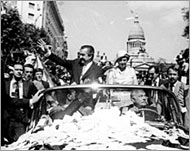Argentina marks 20 years of democracy
Argentina celebrates the 20th anniversary of its return to democracy on Wednesday, with President Nestor Kirchner riding a wave of surprising support.

The South American country will commemorate the end of its last period of military rule, which ran from 1976-1983 on the same day that Kirchner officially starts his term as president, even though he has been in office for six months.
Human rights groups say about 30,000 leftists and suspected radicals were abducted, disappeared and never seen again during the so-called “Dirty War” that marked the dictatorship. The years since, have also seen economic and political turmoil.
But according to one survey released last week, Kirchner had the support of 88.8% of the public and a negative rating of just 4%.
That is significant progress for politicians in a country where in December 2001, thousands marched and chanted: “All of them should go!”
Kirchner took over as president six months early to serve out the remainder of the term of Fernando De la Rua, who departed early, amid violent protests and economic crisis.
Adolfo Rodriguez Saa, and Eduardo Duhalde who briefly succeeded him, were unable to make it to the term’s end and the elected Kirchner took over.
Civilian rule
The two decades of civilian rule are the longest Argentina has known in 70 years.
 |
|
(FILES) President elect Raul Alfonsin |
A survey by the Clarin newspaper said that 79% of Argentinians put “enormous value” in the 20 years of democratic rule, even if a majority also believe that the country was socially and economically better off 20 years ago.
Raul Alfonsin, who was the first democratic president after the end of military rule, said on Tuesday that Kirchner had generally followed good policies.
“The government has worked hard to defend national dignity,” Alfonsin, now 76, told foreign correspondents. “It has negotiated well with the International Monetary Fund.”
Alfonsin said the country had become “more mature” through its democratic experience and that political parties were more constructive rather than systematically blocking government initiatives.
Alfonsin knows the roller-coaster ride of Argentinian politics.
He was also forced to leave office six months early because of hyper-inflation that also sparked public protests.
His successor, Carlos Menem, embarked on a decade of ultra-liberal policies that many Argentinians now blame for the country’s current economic problems.